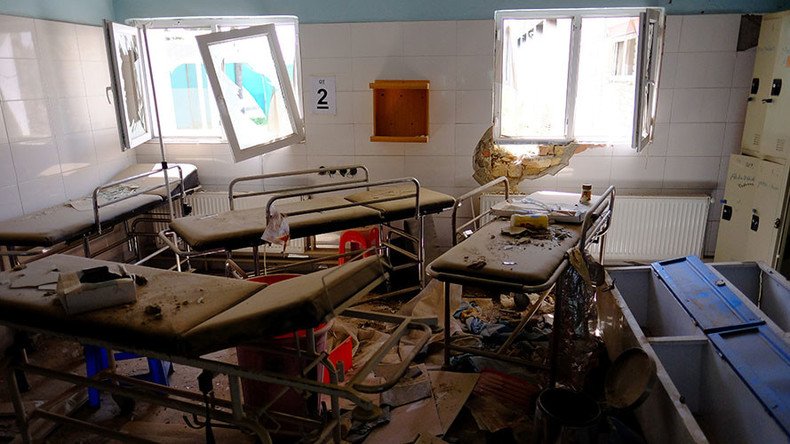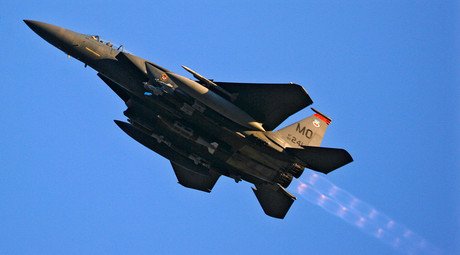‘Attack on Kunduz shows US fails to defeat Taliban’

The US is failing to defeat the Taliban in Afghanistan because they haven’t targeted the extremists’ ideology, says Catherine Shakdam, Shafaqna Institute of Middle Eastern Studies. Poverty and fear among the population provide the group with fresh blood, she adds.
A Doctors Without Borders’ hospital in Kunduz in Afghanistan was hit by over 200 shells during US air strike on 3 October 2015. Forty-two people, including three children, died during the bombardment, and 37 were injured.
On Monday, exactly a year since the tragedy, the Taliban have reportedly entered Kunduz again after launching an offensive just before dawn.
3 October marks 1 year since attack on #Kunduz Trauma Centre in #Afghanistan that left 42 dead & deprived region of medical care #NotATargetpic.twitter.com/3urrKwqQRU
— MSF International (@MSF) 1 октября 2016 г.
RT: Why do you think the Taliban waited until now to try and retake Kunduz? Was it a symbolic anniversary?
Catherine Shakdam: Yes, probably. Very often they are looking for publicity and they are trying to plan the attacks and try to see how to get maximum media attention. It is clearly working – we’re talking about them today. I think the problem though goes beyond that…The simple fact that they are capable of planning those things and carrying them out is worrying, given that we’ve been at war with – the Taliban especially – for over 15 years now. What have we been doing that is not working, because clearly it is not working? When it comes to Afghanistan I don’t think we have a problem in terms of military presence. I think the Afghans are quite capable of defending themselves – if only they were given the proper equipment. It is not even a question of training. It is just a question of entrusting them to defend their own borders and the integrity of the institution. Clearly this has not happened. I don’t quite understand how come we are again surprised that those things are happening. What is the point of spending billions of dollars on reconstruction if we’re not capable of securing the institutions that do exist today and are still under threat?
Hospitals still ‘part of the battlefield’ 1yr since US airstrike on MSF facility in Afghanistan https://t.co/8alzIf4Lpm
— RT (@RT_com) 3 октября 2016 г.
RT: What does the latest Taliban attack say about the US operations against the Taliban in the country?
CS: It has failed... You can’t just go into a foreign land and expect to target an enemy, which is quite illusive anyway because it is linked to an ideology. So you would need to go about destroying the ideology if you want to really destroy its manifestation, which is the Taliban or Al-Qaeda in Afghanistan in particular. If anything it has gone worse and radicals have become even more radical, because we haven’t gone after ideology, we haven’t targeted them where it hurts, which means in terms of the military equipment that they are getting, in terms of the funding that they are getting, in terms of the recruiting that they are capable of running and getting more fresh blood into the armies and enabling them to highjack the population.
The other thing too is that we forget to compute what poverty does to people. The simple fact that some Afghans today are joining in – not because they believe in the ideology of terror, but because they want to eat, or they are too scared of the Taliban so that they decide to join them, because they somehow feel that it is a form of protection. We have failed the Afghan people. The solution is there – inside Afghanistan. A lot of Afghans have set up and said that they wanted to have a different way, they wanted to have their own form of legitimacy in running the country how they think is best for them. But the US has refused to listen to them, and now you see the results of it. You can’t impose anything on people if they don’t want to.
The US is failing to defeat the Taliban in Afghanistan because they haven’t targeted the extremists’ ideology, says Catherine Shakdam, Shafaqna Institute of Middle Eastern Studies. Poverty and fear among the population provide the group with fresh blood, she adds.
RT: Regarding the hospital attack a year ago, Doctors Without Borders says it's a war crime, The Pentagon says it was unintentional and “a tragic mistake”. Why is the US so reticent to take responsibility for what it did?
CS: Because I think it will open… legal floodgates. They would have to answer to too many things: rendition, joint strikes, and all these kinds of things – war crimes. If war crimes are mentioned, when you are mentioning the war against terror, then a lot of questions would need answering. And I don’t think they are prepared to answer them.
The second thing, the kinds of action that the US had carried out in Afghanistan have been replicated across in Syria and in Yemen. Only recently MSF was targeted in Yemen by Saudi Arabia. It is not a war crime, according to Saudi Arabia’s definition. Then again, when you have a country like the US, which is standing on exceptionalism time and time again, then you can understand why we’re having those conversations, and why this narrative is being carried out. As long as the mighty can decide if intention warrants legality for a war crime or not, then we have a big problem – then we’re not talking about legality anymore, we’re talking about the interpretation of law. I would like to think that international law is not up to interpretation. I would like to think that is the case. In this case we’re talking about what democracy and whose democracy?
The statements, views and opinions expressed in this column are solely those of the author and do not necessarily represent those of RT.














